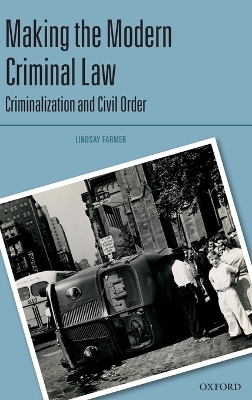
Making the Modern Criminal Law
Criminalization and Civil Order
Seiten
2016
Oxford University Press (Verlag)
978-0-19-956864-2 (ISBN)
Oxford University Press (Verlag)
978-0-19-956864-2 (ISBN)
Offering an historical and conceptual account of criminal law, this volume provides insight into how legal concepts such as responsibility, wrongdoing, intent, and punishment emerged out of debates and sensibilities from the 18th Century to the present day, and explores how the State exerts its power and secures civil order through criminal law.
The Criminalization series arose from an interdisciplinary investigation into criminalization, focussing on the principles that might guide decisions about what kinds of conduct should be criminalized, and the forms that criminalization should take. Developing a normative theory of criminalization, the series tackles the key questions at the heart of the issue: what principles and goals should guide legislators in deciding what to criminalize? How should criminal wrongs be classified and differentiated? How should law enforcement officials apply the law's specifications of offences?
This, the fifth book in the series, offers a historical and conceptual account of the development of the modern criminal law in England and as it has spread to common law jurisdictions around the world. The book offers a historical perspective on the development of theories of criminalization. It shows how the emergence of theories of criminalization is inextricably linked to modern understandings of the criminal law as a conceptually distinct body of rules, and how this in turn has been shaped by the changing functions of criminal law as an instrument of government in the modern state.
The book is structured in two main parts. The first traces the development of the modern law as a distinct, and conceptually distinct body of rules, looking in particular at ideas of jurisdiction, codification and responsibility. The second part then engages in detailed analysis of specific areas of criminal law, focusing on patterns of criminalization in relation to property, the person, and sexual conduct.
The Criminalization series arose from an interdisciplinary investigation into criminalization, focussing on the principles that might guide decisions about what kinds of conduct should be criminalized, and the forms that criminalization should take. Developing a normative theory of criminalization, the series tackles the key questions at the heart of the issue: what principles and goals should guide legislators in deciding what to criminalize? How should criminal wrongs be classified and differentiated? How should law enforcement officials apply the law's specifications of offences?
This, the fifth book in the series, offers a historical and conceptual account of the development of the modern criminal law in England and as it has spread to common law jurisdictions around the world. The book offers a historical perspective on the development of theories of criminalization. It shows how the emergence of theories of criminalization is inextricably linked to modern understandings of the criminal law as a conceptually distinct body of rules, and how this in turn has been shaped by the changing functions of criminal law as an instrument of government in the modern state.
The book is structured in two main parts. The first traces the development of the modern law as a distinct, and conceptually distinct body of rules, looking in particular at ideas of jurisdiction, codification and responsibility. The second part then engages in detailed analysis of specific areas of criminal law, focusing on patterns of criminalization in relation to property, the person, and sexual conduct.
Lindsay Farmer is Professor of Law at the University of Glasgow. He is the author of Criminal Law, Tradition and Legal Order (Cambridge, 1997) and The Trial on Trial III: Towards a Normative Theory of the Criminal Trial (Hart, 2007), as well as a co-editor of the Criminalization series (OUP). He has published widely on different aspects of criminal law and legal theory, and is co-author of the popular jurisprudence textbook, Jurisprudence: Themes and Concepts (2nd edn., Routledge, 2012)
PART I: CRIMINAL LAW AS AN INSTITUTION; PART II: GENERAL; PART III: SPECIAL; PART IV: THE LIMITS OF A NORMATIVE THEORY OF CRIMINALISATION
| Reihe/Serie | Criminalization |
|---|---|
| Verlagsort | Oxford |
| Sprache | englisch |
| Maße | 169 x 236 mm |
| Gewicht | 690 g |
| Themenwelt | Recht / Steuern ► EU / Internationales Recht |
| Recht / Steuern ► Rechtsgeschichte | |
| Recht / Steuern ► Strafrecht ► Kriminologie | |
| Recht / Steuern ► Strafrecht ► Strafverfahrensrecht | |
| ISBN-10 | 0-19-956864-2 / 0199568642 |
| ISBN-13 | 978-0-19-956864-2 / 9780199568642 |
| Zustand | Neuware |
| Haben Sie eine Frage zum Produkt? |
Mehr entdecken
aus dem Bereich
aus dem Bereich
klare Antworten aus erster Hand
Buch | Softcover (2023)
UTB (Verlag)
CHF 27,85


